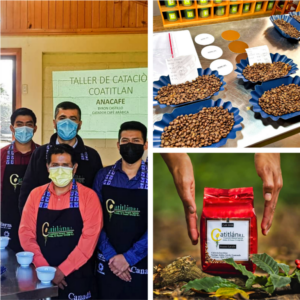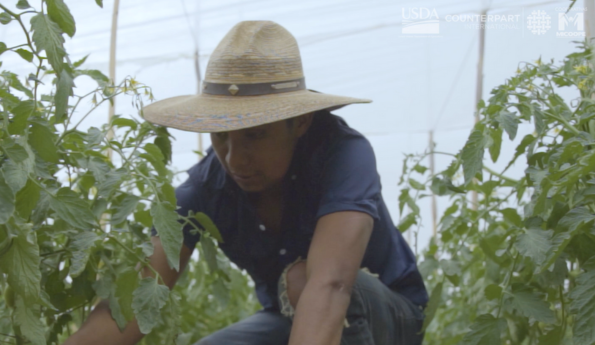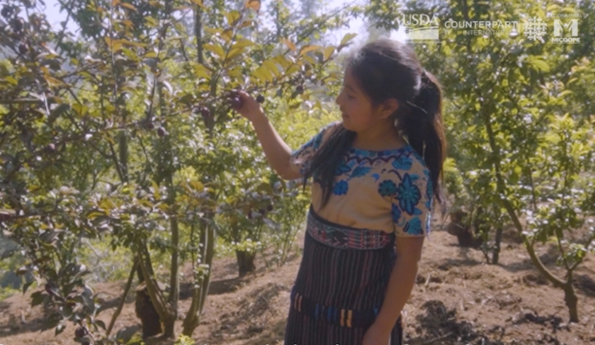Counterpart International’s USDA-funded Food for Progress program prioritizes sustainable economic development and resilient livelihoods with our partners in Guatemala. The National Coffee Association (ANACAFÉ) is one such partner that brings together coffee producers and cooperatives to provide training, opportunities to receive internationally recognized certifications, and even grants to improve production, processing, business development, and market access.
Carlos Ramírez is a program participant from Santiago Atitlán, Sololá. His interest in coffee started when he was just 22 years old, having been inspired by his father who is an associate of the Integral Agricultural Cooperative Atitlán El Paraíso Tz’utujil, R.L.. Carlos is now part of that same coffee cooperative.

Carlos Ramírez tasting various batches of coffee of associates of the Agricultural Cooperative Atitlán El Paraíso Tz’utujil, R.L.
Four years ago, Carlos started roasting coffee and working in the tasting lab for the Atitlan Cooperative. That same year, in partnership with Counterpart, ANACAFÉ launched the Lake Atitlan Ecological Coffee Route as a way to engage new markets and obtain better prices for coffee. The Atitlán Cooperative joined the initiative along with five other organizations. ANACAFÉ helped the cooperative establish a coffee cupping laboratory, which directly benefits the 24 producers that currently make up Coatitlán Cooperative and another 225 producers from the municipality of Santiago Atitlán, Sololá.
In 2019, Carlos was promoted as the coffee roasting and tasting lab coordinator. In this position, Carlos identified areas in which the cooperative could improve.
“The machine that roasted the beans made the flavor of the coffee flat and did not highlight its flavor. A professional taster observed that the error was in the machine and not in the coffee. However, due to the low coffee prices that year, we could not afford to purchase better equipment,” he said. To address this challenge Carlos and the cooperative applied for and received a grant from Counterpart. They were able to use these funds to buy new equipment for roasting and testing, which was essential to the functioning of the cooperative and the coffee lab that they had established.
“Now I can evaluate our coffee from harvest to the final cup,” he says. “This lets us know the quality, how much it is worth, and who our potential customers could be, and we can negotiate better coffee prices with our current buyers.”
With the new equipment and tasting lab, the cooperative no longer has to send the samples to an outside lab, saving money and time. “Now we have that in our own cooperative,” he said. “We will not have to send it to another laboratory and pay a fee.”
Carlos is dedicated to his work and has learned about producing high quality coffee. “The first phase in this process is to conduct the physical analysis of the coffee, and the second is the sensory analysis. In the first phase we can see the color, the smell, the size, defects, all of which we need to know so we can market our coffee properly,” he shared. “In the second stage, when we roast the coffee, we let it rest for eight hours and then taste it. Then we can evaluate the attributes of the coffee and identify the coffee that has stood out the most.”
The Integral Agricultural Cooperative Atitlán El Paraíso Tz’utujil, R.L., is now evaluating the potential to expand their impact and create a coffee school, since it has had good experiences with young people such as Carlos. The cooperative has begun preparing the curriculum for the training program.
The prospect of teaching others is an exciting prospect for Carlos. “I will be able to transmit to other young people how much ANACAFE taught me and how important it will be to other young people, who have the dream of following the tradition of their parents and grandparents to continue growing coffee, and not let this beautiful crop be forgotten.”
Learn more about the USDA-funded Food for Progress program in Guatemala here.
See related story about the agricultural cooperative Tinamit Tolimán Integral here.
Watch Carlos explain the benefits of having a lab that improves quality (in Spanish):




